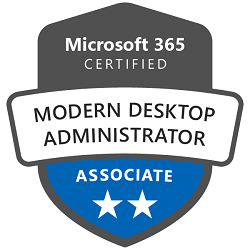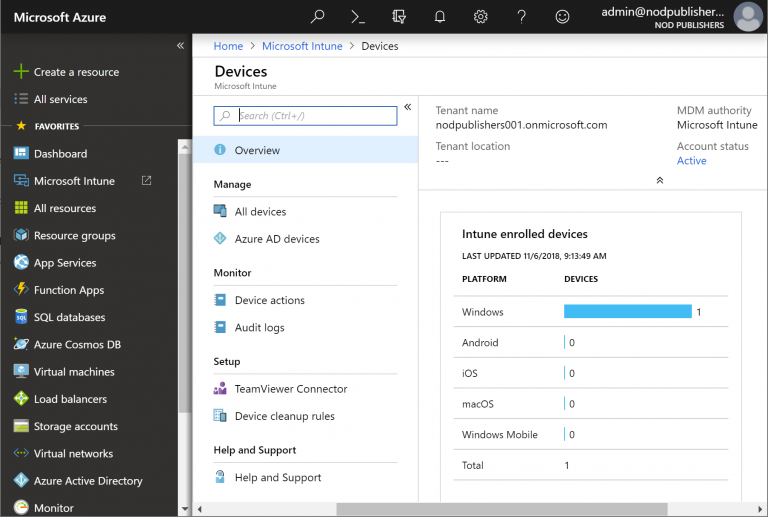Obiettivi | Certificazione | Contenuti | Tipologia | Prerequisiti | Durata e Frequenza | Docenti | Modalità di Iscrizione | Calendario

Il Corso Microsoft 365 Endpoint Administrator MD-102 è un programma progettato per fornire ai partecipanti le competenze necessarie per pianificare ed eseguire strategie di distribuzione degli endpoint in un ambiente aziendale. Il corso copre una vasta gamma di argomenti, tra cui la gestione “moderna” degli endpoint, l’integrazione di Microsoft Intune e le tecniche di distribuzione delle applicazioni. I partecipanti impareranno anche a implementare misure di sicurezza avanzate utilizzando tecnologie come Azure Active Directory, Azure Information Protection e Microsoft Defender for Endpoint. Questo corso è particolarmente utile per i professionisti IT che hanno già una certa familiarità con i workload di Microsoft 365 e hanno esperienza nella gestione di dispositivi Windows e non Windows. Il corso contribuisce alla preparazione dell’esame di Certificazione Microsoft 365 Certified Endpoint Administrator Associate.
Contattaci ora per ricevere tutti i dettagli e per richiedere, senza alcun impegno, di parlare direttamente con uno dei nostri Docenti (Clicca qui)
oppure chiamaci subito al nostro Numero Verde (800-177596)
Obiettivi del corso
Di seguito una sintesi degli obiettivi principali del Corso Microsoft 365 Endpoint Administrator MD-102:
- Preparazione e implementazione di Windows client.
- Gestione di identità e conformità.
- Manutenzione e protezione dei dispositivi.
- Gestione del ciclo di vita dei dispositivi in Intune.
- Distribuzione e aggiornamento delle applicazioni.
Certificazione del corso
Esame MD-102 Endpoint Administrator; Questo esame valuta le competenze nell’amministrare dispositivi e applicazioni in un ambiente Microsoft 365. Copre una vasta gamma di argomenti, dalla distribuzione di Windows client alla gestione di identità e conformità. Include la manutenzione e protezione dei dispositivi, la gestione delle applicazioni e la gestione del ciclo di vita dei dispositivi in Intune. Questo esame richiede una comprensione approfondita della distribuzione e aggiornamento delle applicazioni, oltre alla capacità di implementare soluzioni per la gestione efficiente degli endpoint su vari sistemi operativi e tipi di dispositivi.
Contenuti del corso
Prepare for a Windows client deployment
- Select a deployment tool based on requirements
- Choose between migrate and rebuild
- Choose an imaging and/or provisioning strategy
- Select a Windows edition based on requirements
- Implement subscription-based activation
- Deploy Windows 365
Plan and implement a Windows client deployment by using Windows Autopilot
- Configure device registration for Autopilot
- Create, validate, and assign deployment profiles
- Set up the Enrollment Status Page (ESP)
- Deploy Windows devices by using Autopilot
- Troubleshoot an Autopilot deployment
Plan and implement a Windows client deployment by using the Microsoft Deployment Toolkit (MDT)
- Plan and implement an MDT deployment infrastructure
- Create, manage, and deploy images
- Monitor and troubleshoot a deployment
- Plan and configure user state migration
Configure remote management
- Configure Remote Help in Intune
- Configure Remote Desktop on a Windows client
- Configure the Windows Admin Center
- Configure PowerShell remoting and Windows Remote Management (WinRM)
Manage identity
- Implement user authentication on Windows devices, including Windows Hello for Business, passwordless, and tokens
- Manage role-based access control (RBAC) for Intune
- Register devices in and join devices to Microsoft Entra ID
- Implement the Intune Connector for Active Directory
- Manage the membership of local groups on Windows devices
- Implement and manage Local Administrative Passwords Solution (LAPS) for Microsoft Entra ID
Implement compliance policies for all supported device platforms by using Intune
- Specify compliance policies to meet requirements
- Implement compliance policies
- Implement Conditional Access policies that require a compliance status
- Manage notifications for compliance policies
- Monitor device compliance
- Troubleshoot compliance policies
Manage the device lifecycle in Intune
- Configure enrollment settings
- Configure automatic and bulk enrollment, including Windows, Apple, and Android
- Configure policy sets
- Restart, retire, or wipe devices
Manage device configuration for all supported device platforms by using Intune
- Specify configuration profiles to meet requirements
- Implement configuration profiles
- Monitor and troubleshoot configuration profiles
- Configure and implement Windows kiosk mode
- Configure and implement profiles on Android devices, including fully managed, dedicated, corporate owned, and work profile
- Plan and implement Microsoft Tunnel for Intune
Monitor devices
- Monitor devices by using Intune
- Monitor devices by using Azure Monitor
- Analyze and respond to issues identified in Endpoint analytics and Adoption Score
Manage device updates for all supported device platforms by using Intune
- Plan for device updates
- Create and manage update policies by using Intune
- Manage Android updates by using configuration profiles
- Monitor updates
- Troubleshoot updates in Intune
- Configure Windows client delivery optimization by using Intune
- Create and manage update rings by using Intune
Implement endpoint protection for all supported device platforms
- Implement and manage security baselines in Intune
- Create and manage configuration policies for Endpoint security including antivirus, encryption, firewall, endpoint detection and response (EDR), and attack surface reduction (ASR)
- Onboard devices to Microsoft Defender for Endpoint
- Implement automated response capabilities in Microsoft Defender for Endpoint
- Review and respond to device issues identified in the Microsoft Defender Vulnerability Management dashboard
Deploy and update apps for all supported device platforms
- Deploy apps by using Intune
- Configure Microsoft 365 Apps deployment by using the Microsoft Office Deployment Tool or Office Customization Tool (OCT)
- Manage Microsoft 365 Apps by using the Microsoft 365 Apps admin center
- Deploy Microsoft 365 Apps by using Intune
- Configure policies for Office apps by using Group Policy or Intune
- Deploy apps from platform-specific app stores by using Intune
Plan and implement app protection and app configuration policies
- Plan and implement app protection policies for iOS and Android
- Manage app protection policies
- Implement Conditional Access policies for app protection policies
- Plan and implement app configuration policies for managed apps and managed devices
- Manage app configuration policies
Tipologia
Corso di Formazione con Docente
Docenti
I docenti sono Istruttori Autorizzati Microsoft e in altre tecnologie IT, con anni di esperienza pratica nel settore e nella Formazione.
Infrastruttura laboratoriale
Per tutte le tipologie di erogazione, il Corsista può accedere alle attrezzature e ai sistemi presenti nei Nostri laboratori o direttamente presso i data center del Vendor o dei suoi provider autorizzati in modalità remota h24. Ogni partecipante dispone di un accesso per implementare le varie configurazioni avendo così un riscontro pratico e immediato della teoria affrontata. Ecco di seguito alcuni scenari tratti dalle attività laboratoriali:

Dettagli del corso
Prerequisiti
- Si consiglia la partecipazione al Corso Microsoft 365 Fundamentals.
Durata del corso
- Durata Intensiva 5gg;
Frequenza
Varie tipologie di Frequenza Estensiva ed Intensiva.
Date del corso
- Corso Microsoft 365 Endpoint Administrator (Formula Intensiva) – 08/04/2024 – 09:00 – 17:00
- Corso Microsoft 365 Endpoint Administrator (Formula Frazionata) – 29/05/2024 – 09:00 – 17:00
Modalità di iscrizione
Le iscrizioni sono a numero chiuso per garantire ai tutti i partecipanti un servizio eccellente.
L’iscrizione avviene richiedendo di essere contattati dal seguente Link, o contattando la sede al numero verde 800-177596 o inviando una richiesta all’email [email protected].


